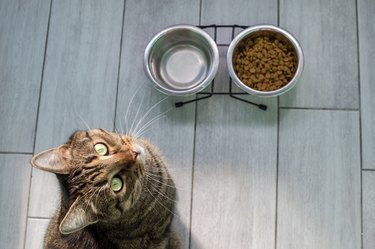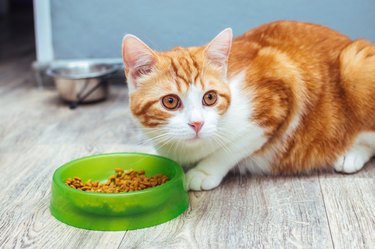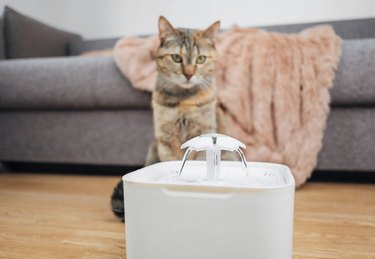There's an old belief in many cat circles that a feline's food and water dishes shouldn't be kept in close proximity to one another. But why is this? A quick guess might lead you to assume that spilling water so close to a food dish might just make a huge mess of your cat's eating area. Another guess might make you think that food pieces could easily fall into a water bowl if they're kept so close. While both are certainly possible depending on how your cat eats, are either of these reasons enough to keep a water bowl and food bowl far apart? And if not, where did such a belief come from?

Video of the Day
Why keep cat water away from their food?
If you're curious, you might be a bit disappointed as there isn't exactly a definite answer to this question. Cats have a natural tendency to hunt, which can be seen in their stalking and pouncing behaviors. Some experts state that they may be confused then a readily available water source is immediately next to their food, as that wouldn't necessarily happen in the wild. Others say that, because cats are still naturally attuned to possible bacterial buildup in their water, any food particles that might transfer from their food dish into their water dish will automatically make the water undrinkable to them. And others claim that cats don't like to smell food when they drink water. Any of this is certainly the case with some cats, but not all will refuse to drink water near food.
Video of the Day

While these scenarios may track for some cats, it's still not certain that this is a reason to not keep cat food and water close to one another. In fact, some sources recommend keeping your cat's food and water dishes close to each other if you want to encourage your cat to drink more. Cats have evolved to get most of their hydration from the prey they consume, like mice, which are about 70% water. They may need less water than dogs, but they still need some, especially if they have a urinary-related disease, like kidney disease, renal failure, or a urinary tract infection.
Cat habits when drinking water
What is certain, however, is that many cats definitely do prefer to drink water from a water source that's in constant movement or flow. This is thanks to a survival trait that's inherited from their ancient ancestors, who would have to seek out water from a running source, like a stream. Stagnant water has more potential for harboring bacteria, so many wild animals naturally avoid it. Many wild and feral cats today still do the same thing in an effort to stay safe, and the tendency to sip from a flowing stream, like the bathroom or kitchen faucet, is still exhibited by domesticated cats. Not all cats will refuse to drink water from a standing dish, but if you have a cat who won't drink from a bowl, the option of a cat water fountain is a great way to get around this issue while also meeting their need for enrichment.

Best tips for cat water consumption
If you currently keep your cat's food and water bowls next to each other and aren't noticing a problem, like a refusal to eat or drink, you probably shouldn't change a thing. However, if you see that your cat isn't drinking water from their food bowl, or you constantly find cat food in your cat's water dish then it may be time to separate the two stations — you won't need to go too far, just a few feet away should suffice. Using a cat water fountain as your cat's primary water source may also solve issues with non-drinking. If you cannot keep your cat's food and water too far apart for spatial reasons, you can encourage your cat to drink by cleaning their water dish every day, as well as anytime you see food or other debris floating in the water. You can also try using other bits of surface area, like up on a counter, to keep a water dish, which will certainly meet that inherent cat instinct to seek out a fresh water source if that belief holds true.